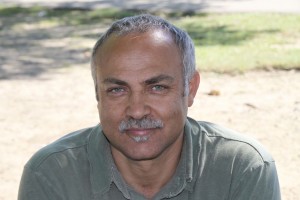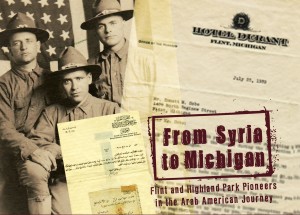

“Why do so many Arabs own grocery stores?”
Bawardi was an enthusiastic graduate student when he set out to discover an answer to the question that often nagged him.
His research led him to the sons and daughters of immigrant pioneers who started grocery retailing a century ago in Genesee County after a brief stint in peddling. Finally, he landed in the basement of a Grand Blanc, Mich., home owned by Roy Farah.
There, Bawardi found hundreds of letters and documents from Farah’s father, Ameen, that detail what life was like for Syrian immigrants in the early 20th century.
“Just glancing at the papers, I was struck by their importance,” said Bawardi, an assistant professor of history at University of Michigan-Dearborn. “But when Roy gave me the papers, I knew he sat a new course for my intellectual pursuits.”
Today, many of those historical items are stored in his home, as part of a unique archive that focuses on Arab Americans and their transition to U.S. citizenship.

The archives are far from idle, as Bawardi has curated different exhibits at UM-Dearborn in 2010 and at the Arab American National Museum last March, with support from the university’s Arab American Studies program and local attorney Joumana Kayrouz. The exhibits attracted hundreds of visitors, including some from as far away as Canada. Bawardi soon plans to unveil a third exhibit, “The Making of Arab Americans,” in January at the Sloan Museum in Flint.
“We missed the boat on chronicling the lives and activities of the early generations, the pioneers, as well as their sons and daughters,” he said. “Many questions were never asked, even when someone bothered to talk to them. These archives are the closest thing we have to capturing a completely forgotten period within Arab-American history.”
His archive contains hundreds of letters from important notables and photographs of Syrian immigrants, as well as publications and meeting minutes from Arab-American political organizations. The oldest item is a tapestry that dates back to the Centennial Exposition of 1876 in Philadelphia.
UM-Dearborn students Zahra Tarraf and Matthew Remey selected a proposal submitted by Bawardi to scan the archival documents, as part of the Honors Transfer Innovators project. Bawardi also is working with two students on fulfilling a Community-based Research Seed Grant to record Arab-American oral histories.
“Professor Bawardi has assembled an incredibly important and revealing archive that offers us the rare opportunity to explore and interpret a first-generation immigrant experience that has largely been ignored or generalized by historians,” said Martin Hershock, dean of UM-Dearborn’s College of Arts, Sciences, and Letters. “To have access to the thoughts of a pioneering population such as this one is an incredibly unique thing for researchers. Professor Bawardi is to be commended for his great foresight and respect in compiling this collection.”
Bawardi’s research has spanned a decade and taken him across three continents; however, many of his findings contradict the initial assumptions involving Syrian immigrants. For instance, Bawardi negates the belief that Arab Americans were disorganized, sectarian and apathetic when it comes to politics.
“My work, as a whole, challenges the salient assumptions made about Arab Americans,” he said. “They brought with them well-developed plans for catching up to the rest of the world. We know of Gibran and his book, The Prophet, but many of Gibran’s capable friends have left behind a massive body of literature that has not been touched for the most part. I am translating two volumes that will add to our knowledge on their experiences in the 1890s through the 1930s.”
Bawardi utilizes the archive not only to educate, but also to commemorate Arab Americans who played vital roles in the early 20th century.
“I want to remember and honor those pioneers who worked tirelessly to preserve Arab culture in the U.S., and uphold their old country’s quest for democracy and equality,” said Bawardi, who based his upcoming book off the archive.
The Making of Arab Americans: From Syrian Nationalism to U.S. Citizenship, published by University of Texas Press, is available on Amazon. The book is slated to hit shelves early next year.





